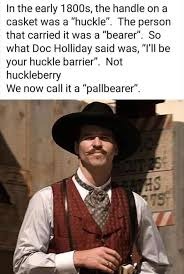I'm Your Huckleberry
- Matthew Kerns

- May 31, 2025
- 3 min read
“I’m Your Huckleberry”—The Truth Behind Doc Holliday’s Famous Line
A popular internet myth insists that when Val Kilmer, as Doc Holliday in Tombstone (1993), says “I’m your huckleberry,” he’s really saying “I’m your huckle bearer”—a supposed 19th-century term for a pallbearer, based on the mistaken belief that “huckles” were handles on a casket. It’s an evocative theory, often repeated with confidence in comment sections and fan forums. But it’s simply not true.
The film’s script clearly reads “huckleberry,” and Kilmer himself confirms this in his memoir, I’m Your Huckleberry, writing: “I do not say, ‘I’m your huckle bearer.’ I say, ‘I’m your huckleberry,’ connotating, ‘I’m your man. You’ve met your match.’” Even decades before the film, a 1932 newspaper account of a fictional Doc Holliday / Johnny Ringo standoff used the exact phrase: “I’m your huckleberry, Ringo.”
So what does it really mean to be someone’s “huckleberry”? In 19th-century American slang, especially in the South, the phrase had a clear meaning: to be the right person for the job, or the one willing to take on a challenge. It was often used playfully or with a touch of bravado. A charming example from an 1875 poem in The Buffalo Commercial shows a young woman responding to a romantic compliment with, “Well, I’m your huckleberry.”

The line had no funereal overtones—it simply meant she was up to the task, a good match, or a spirited partner. The phrase was part of a broader Southern idiom: “a huckleberry over a persimmon,” meaning just a notch better, a cut above the rest, or slightly beyond one’s grasp. This was a common saying in the mid-19th century, appearing in regional papers, humor columns, and even jokey glossaries of Americanisms.

You’ll find it explained in sources like The Sydney Morning Herald (1868), where “huckleberry above the persimmon” is defined as “something beyond one’s power,” and in The Times-Picayune (1842), which defined a “huckleberry” as “something superior to a persimmon.”

One article in the Philadelphia Gazette noted, “In our South, if a man attains distinction, it is said that he is a huckleberry above his neighbor’s persimmon.” Over time, “a huckleberry above a persimmon” was shortened to simply “I’m your huckleberry.” It was a way of saying someone was slightly better, sharper, or more capable—exactly the kind of flair you’d expect from a well-read Southern gambler like Holliday, letting his fellow southern rival Johnny Ringo know he's met his superior.

The line “I’m your huckleberry” wasn’t invented in 1993 by screenwriter Kevin Jarre, nor was it a piece of postmodern flair retrofitted to a 19th-century gunslinger. A 1932 article from a California newspaper already imagined Doc Holliday saying those very words to Johnny Ringo in Tombstone, Arizona, as he accepted a challenge to a duel. Jarre, who meticulously researched the people, places, and language of the Old West, didn’t stumble upon a random Southern phrase—he chose one that had already been tied to Holliday and his legendary standoff. The line roots Doc’s character firmly in his Georgia upbringing, reflects his educated but combative persona, and adds authenticity to one of the greatest Westerns ever made. Far from being an invention of the screen, “I’m your huckleberry” was a line pulled from the past, dusted off, and delivered with deadly charm.

The phrase “I’m your huckleberry” wasn’t some cryptic funeral reference or invented screenwriting flourish—it was a real, recognizable bit of Southern vernacular. It carried the swagger of a challenge, the charm of old-time courtship, and the plainspoken confidence of someone ready to step up. Whether in romantic verse, backroom brawls, or imagined frontier duels, it meant exactly what Doc intended. By the time Tombstone brought Doc Holliday’s drawled line to the big screen, the phrase already carried a century of Southern linguistic weight. It didn’t need revisionist funeral etymology—it already meant exactly what it needed to: You’ve met your match.









Comments